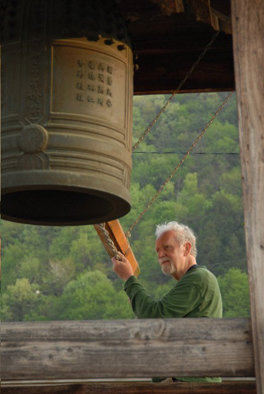Documentary Film Screening |
||||||||||
and Discussion with |
||||||||||
Richard Werbner |
 |
|||||||||
|
Date May 18 (Monday) Time 10:00-13:00, charge-free Place Mid. Conference Room (Chu-kaigishitsu), the 3rd floor in INAMORI New building, Kyoto University  |
||||||||||
|
Richard Werbner Professor Emeritus in African Anthropology, Honorary Research Professor in Visual Anthropology, Manchester University |
||||||||||
| Film 1. |
"Shade Seekers and the Mixer" |
|||||||||
|
Directed by Richard Werbner Duration: 57 min. Location: Botswana. English Subtitles, 2007 |
||||||||||
|
Synopsis: Set in Moremi village within Botswana's awesome Tswapong hills, this film makes village elders self-consciously reflexive. The elders, including a controversial healer, view and discuss an earlier film of his séances with a participant, a former patient, now the anthropologist’s research assistant. Their main subject is Seriti. Literally 'Shade'. The idea ties dignity, power and charisma to the light in which a person is seen by others, the dead and the ancestors above all. The healer's own Seriti is regarded at risk. He is accused of polluting the earth, of wrongly making the public private for personal gain. Elders condmen him but he defends his God-given mission for 'the original way'. The film discloses the intimate play of light and dark in the villagers' lives, their concern for well-being and the public good, against the background of séances, a funeral, a wedding and a sacrifice to restore communication with the ancestors. |
||||||||||
| Film 2. |
"SÉANCE REFLECTIONS WITH RICHARD WERBNER" |
|||||||||
|
Directed by Richard Werbner Duration: 45 min. Location: Botswana. English Subtitles, Produced by The International Centre for Contemporary Cultural Research, Manchester 2004 |
||||||||||
|
Synopsis: Njebe and Martha, a childless couple living in Botswana's capital, seek to recover their well-being by consulting a charismatic diviner and healer, Rantii, in Njebe's old village, Moremi. Filmed watching their séances on a monitor, at the University of Botswana, they reflect with ethnographer Richard Werbner, who has known Njebe since he was a boy. They review the hidden and the seen, the secret and the said, in their troubles. They try, sometimes with difficulty, to make sense of the seances' puzzling moments. They wonder about the diviner's rapid recital of highly ambiguous, archaic verse, his leading them in chants of call and response and his preaching against Christianity and for restored communication with the ancestors. Bringing their retrospection into perspective are the film's observed sequences from the séances and also from every day moments in Martha's life as a teacher at a Muslim nursery school and in Njebe's life as a landlord, now unemployed. Photographs from the ethnographer’s research in the 1970's further illuminate memories of Njebe's family -of his grandfather, a famous diviner who wanted to pass his occult gift on to Njebe, and of his grandmother, who reared Njebe. Her recent, quarrelsome funeral grieves Njebe, and becomes an important concern during his seance. The film turns back and forth in time, and it moves across town and country. It follows the recovery of remembered experience, the uncertainties of interpretation during and after séances, the blaming of occult attack on others, and the understanding of personal responsibility for failure to be caring of kin. It thus illuminates some of the predicaments of urban villagers who straddle the city and the village. Discussion after the screening will be videotaped. (INAMORI New building is the three story building on Kawabata St. and Konoe St., near by Kojinbashi-bridge. The nearest station is Jingū-Marutamachi eki, Keihan line) |
||||||||||

|
|
|
|
|
|
|
|
|
|
|